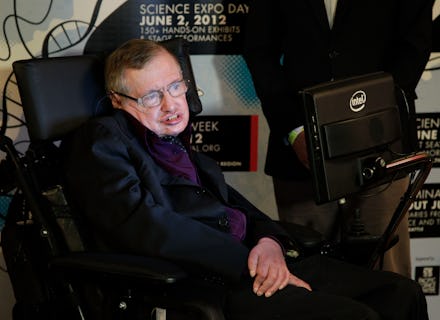Stephen Hawking Says Our Next Greatest Scientific Discovery May Be Our Last

The news: Stephen Hawking has proposed that research into the Higgs boson could spawn the mother of all doomsday scenarios: the total collapse of space and time. Forget the end of mankind, Hawking speculates, and begin pondering the end of reality.
Death-by-boson could occur if scientists put the particle under incredible levels of energy, creating a "catastrophic vacuum decay" that would obliterate the known universe. In the introduction of the new book Starmus, a collection of lectures by respected scientists, Hawking explains how the "God particle" could get all Old Testament on us:
"The Higgs potential has the worrisome feature that it might become megastable at energies above 100bn giga-electron-volts (GeV)."
"This could mean that the universe could undergo catastrophic vacuum decay, with a bubble of the true vacuum expanding at the speed of light."
"This could happen at any time and we wouldn't see it coming."
Don't worry, though: Hawking freely admits that modern-day physicists don't have the capability to build an accelerator large enough to spark such an intense reaction, and it's hard to know if we ever will. The physicist says that the device would be larger than Earth itself, making it "unlikely to be funded in the present economic climate." Theoretical physicist John Ellis further told The Daily Mail that such a scenario couldn't happen at the Large Hadron Collider because the energies involved are "far too low."
A particle accelerator works by pushing subatomic particles to incredible speeds, filling them with ever-increasing levels of energy before slamming them together. Physicists then examine even tinier fragments of the particles as they shatter, the method Cern researchers used to discover the Higgs (an incompletely-understood particle thought to play a role in the creation of mass) in 2012. When the LHC was turned on in 2008, some scientists (aided by a bevy of internet conspiracy theorists) theorized that the device could accidentally cause a massive black hole to swallow the entire planet, leading to this unintentionally hilarious video:
Crying wolf? What's more, scientists have criticized Hawking for years about his increasingly far-flung doomsday "hype." That list includes his proclamation in 2012 that a man-made virus would wipe out humanity within a thousand years, his 2010 announcement that first contact with aliens would result in the end of civilization or his 2006 statement that global warming could make Earth "like Venus, at 250 degrees centigrade and raining sulfuric acid."
After all his accomplishments, Hawking has arguably earned the right to play Nostradamus a little, whether or not it makes his doomsday theories any more credible. But let's take Hawking at his word and assume some madman went ahead and built a planet-sized particle accelerator anyhow. Since the true vacuum would expand at the speed of light and instantaneously destroy anything it touched, humanity would essentially painlessly disappear at the flip of a switch, and we wouldn't even have time to realize it. That's at least a little less unpleasant than being wiped out by plague, giant asteroids, zombies, alien invasion or grey goo, right? Plus, tourists from alternate realities could swing by and make fun of us for screwing up so hardcore we ruined an entire universe.